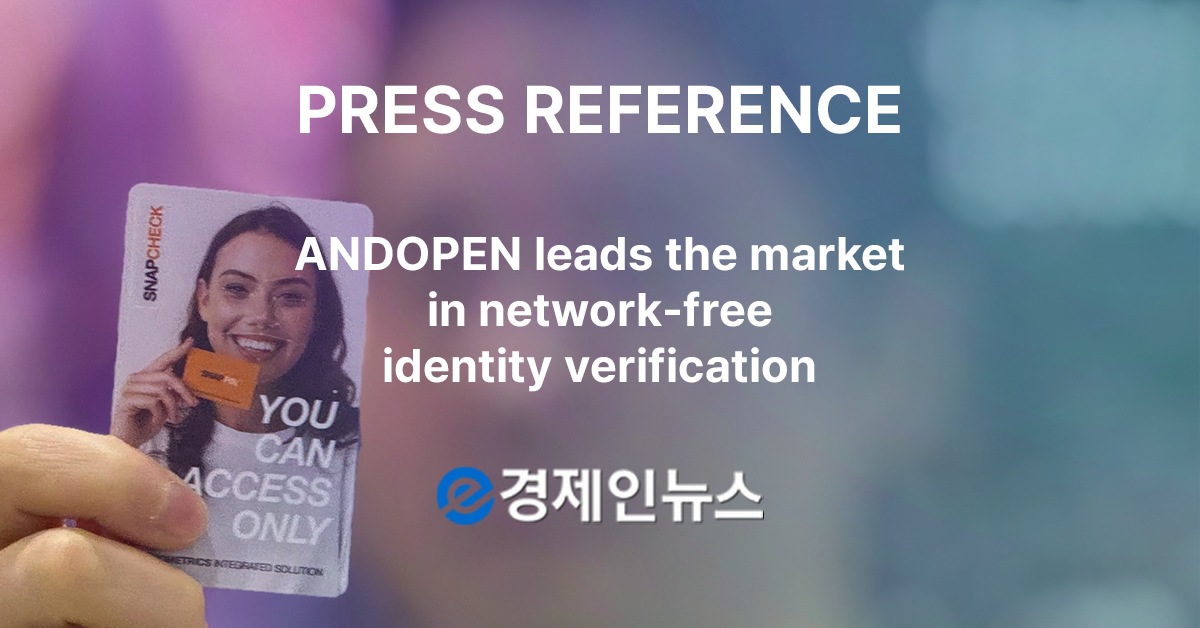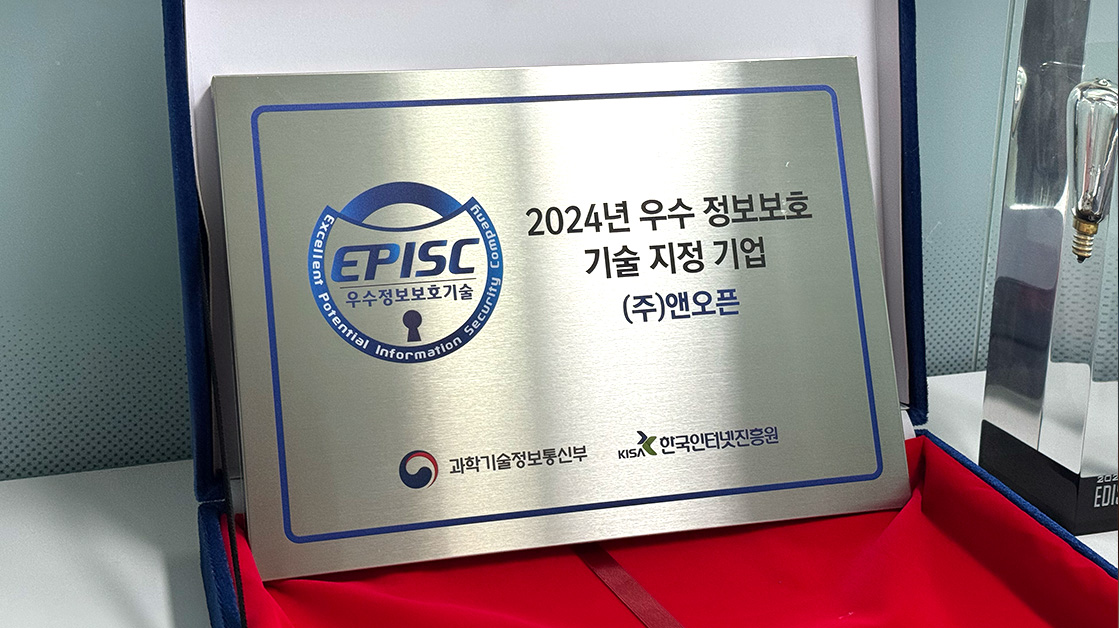* Disclaimer:
This article has been translated into English from Korean. Readers viewing this page in a language other than English will see a machine translation of the English translation. Being an unofficial translation, the article represents neither ANDOPEN’s nor Newseconomy’s viewpoints. To view the original article, please visit Newseconomy.

As Generative AI and related services rapidly advance, the issue of protecting personal information has emerged as a major societal concern. Especially as biometric information is used in everyday life – unlocking phones, digital payments, online banking, and the like, there is an ever-increased need to protect it against abuse. Unique biometric properties like fingerprints, facial features, irises, and voice can not be changed once leaked, potentially resulting in long-term harm.
If the vast amounts of personal data collected by AI are misused, the consequences could go beyond simple privacy violations, leading to serious second-order crimes such as financial crimes and identity theft. In this context, the importance of AI-based security technologies is gaining greater attention. Various solutions aimed at strengthening personal data protection and preventing data leaks in advance are now in the spotlight.
ANDOPEN offers solutions that address the vulnerabilities of conventional biometric authentication systems—such as data tampering and network-based hacking. We spoke with Jayden Lee, CEO of ANDOPEN, who is committed to building a trustworthy digital environment.
What does ANDOPEN do?
ANDOPEN was founded in February 2018 and specializes in AI-enhanced security technologies. The company focuses on researching and developing identity authentication technologies aimed at building a trustworthy digital society. Their goal is to provide authentication—the starting point of all digital services—in the most convenient and secure way possible. ANDOPEN strives to deliver security and usability to everyone, regardless of demographic or environment.
Offering biometric authentication to an unspecified number of users inherently means storing vast amounts of personal and biometric data somewhere, which poses significant risks in terms of security and privacy. The same concerns apply to telecom-based authentication services. At some point, not having a phone registered under your name has made it almost impossible to prove you’re a citizen of Korea. [Editor’s note: for context, in Korea, telecoms provide identity verification services for governmental and banking services, primarily through SMS code verification.] Mobile phones have effectively replaced national identification, raising the question of whether the government should issue phones as official IDs.
Being unable to verify one’s identity simply because they don’t have a phone reflects a fundamentally flawed system. There must be a structure in place that allows individuals to prove their identity under any circumstances. This awareness of the issue led ANDOPEN to develop a more fundamental and secure method of identity verification.
Guided by a privacy-first philosophy, ANDOPEN believes that users should have control over their own data. To that end, all authentication information is stored in a decentralized manner on the user’s card or device, rather than relying on networks or servers. This is not just a technical choice but an ethical commitment to upholding user rights.
ANDOPEN aims for inclusivity and universality, offering authentication solutions that are accessible to digital minorities such as older persons, people with disabilities, teenagers, and those without smartphones. The company believes security should not be a privilege for a few but a foundational infrastructure embedded naturally into everyone’s daily lives.
In line with this belief, ANDOPEN places ethical use and social responsibility at the forefront when leveraging biometric and AI technologies. Rather than enabling surveillance, it seeks to enhance protection; rather than imposing restrictions, it promotes freedom. The company is committed to contributing to the creation of a safer digital society.
What is ANDOPEN’s core business and differentiation?
ANDOPEN’s standalone biometric authentication solution, SNAPPASS, enables identity verification through facial recognition—even without a smartphone. As a biometric identity infrastructure that functions without network connectivity, it positions itself as a future-ready solution that prioritizes privacy.
While traditional authentication methods rely on centralized servers, networks, and smartphones—often collecting and storing biometric data without adequate safeguards—SNAPPASS takes a fundamentally different approach. It stores the user’s biometric data directly on a personal card (SNAPPIN), owned and carried by the user. Since authentication is the starting point of all services, it must be both secure and convenient. For this reason, ANDOPEN utilizes standard cards—like payment or access cards—that are already issued over 42 billion times annually worldwide. Biometric data is securely encrypted and compressed into the card itself, used during authentication, and immediately discarded afterward—without the need for batteries or networks.
This architecture fundamentally eliminates the security vulnerabilities seen in conventional biometric systems, including data breaches, tampering, and network-based hacking. SNAPPASS uses AI-powered facial matching and liveness detection algorithms to complete authentication in under one second, making it viable even in offline environments. By removing the need for network transmission and ensuring that biometric data is immediately discarded after use, it offers complete protection against personal data leakage.
While concerns may arise around theft, duplication, or misuse of access cards, SNAPPASS renders such scenarios nearly impossible by combining card technology with facial recognition. The system is designed so that users maintain complete control over their own authentication data. In an era where AI-powered threats like deepfakes and spoofing are becoming more sophisticated, SNAPPASS proudly presents itself as an innovative technology that achieves both robust threat detection and strong privacy protection.
Because of this, SNAPPASS can be effectively deployed in public, healthcare, and financial environments where inclusive access is essential—such as for those without smartphones, the elderly, and other digitally underserved groups. With broad applicability in physical security, finance, ticketing, public access control, and identity verification for welfare services, SNAPPASS aims to become the global standard model for decentralized authentication.
ANDOPEN’s technology has been recognized with several international accolades, including a 2025 CES Innovation Award, Edison Award, MWC 2025 Editor’s Choice Award, and designation as an Excellent Potential Information Security Technology by Korea’s Ministry of Science and ICT. The company is currently engaged in multiple collaboration projects with Gartner, global financial institutions, and international authentication and security firms, aiming to jointly advance digital inclusion and privacy protection.
What are ANDOPEN’s future goals?
SNAPPASS combines network-free biometric authentication technology with AI-based security to overcome the limitations of conventional authentication methods. This enables enhanced security and efficiency across various industries such as finance, public services, retail, physical security, ticketing, and membership systems, creating significant economic value. From the early stages of market entry, SNAPPASS has been designed with scalability and financial sustainability in mind.
Specifically, it is expected to reduce social costs by preventing identity fraud and financial crimes. In South Korea alone, annual financial fraud losses—including phishing and bank accounts used for fraud—amount to around 2 trillion KRW, with even greater losses globally. SNAPPASS provides a card-based biometric authentication method that is resistant to forgery or impersonation, significantly reducing the risk of identity theft and financial fraud.
The solution also minimizes false recognition, prevents unauthorized access, and offers rapid authentication, all of which contribute to greatly enhanced security. It is structurally prepared to meet national-level identity verification needs and can be applied to areas such as public welfare services and digital ID verification. As such, it aims to establish itself as an innovative solution in access control markets across airports, government agencies, private sector organizations, research institutions, and smart buildings.
Starting this year, the company will focus on increasing domestic sales and accelerating export efforts. ANDOPEN has already established partnerships with clients and institutions in the United States, Japan, the Netherlands, Belgium, Spain, Italy, and South Africa, including financial institutions, kiosk manufacturers, and concert venue operators. The company is also in discussions regarding a national public ID system.
We invite your continued interest in ANDOPEN’s journey ahead.
Find out what the hype is all about:


